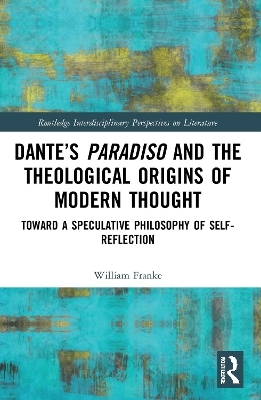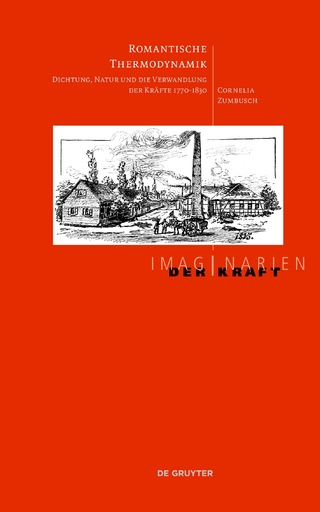
Dante’s Paradiso and the Theological Origins of Modern Thought
Routledge (Verlag)
978-0-367-74034-4 (ISBN)
William Franke is a philosopher of the humanities, a Dante scholar, and professor of comparative literature and religion at Vanderbilt University. He has also been professor and chair of philosophy at the University of Macao (2013–16); Fulbright-University of Salzburg Distinguished Chair in Intercultural Theology and the Study of Religion (2006–07); and Alexander von Humboldt-Stiftung research fellow at the University of Potsdam (1994–95).
PROLOGUE
AKCNOWLEDGMENTS
INTRODUCTION: The Theological Apotheosis of Lyric in Dante's Paradiso
1. Self-Reflexion and Lyricism in the Paradiso
2. Orientation to Philosophical Logics and Rhetorics of Self-Reflexivity
3. Self-Reflexive Lyricism and Ineffability
PART I. The Paradiso’s Theology of Language and its Lyric Origins: Out of the Abyss
4. The Self-Reflexive Trinitarian Structure of God and Creation
5. Beyond Representation—Origins of Lyric Reflection in Nothing
6. The Circularity of Song—and its Mystic Upshot
7. Self-Reflexive Fulfillment in Lyric Tradition and its Theological Troping by Dante
8. The Lark Motif and its Echoes
9. An Otherness Beyond Objective Representation and Reference
10. The Mother Bird’s Vigil—Canto XXIII and the Lyric Circle
11. Ineffability in the Round—and its Breakthrough
12. The Substance of Creation as Divine Self-Reflection
13. Eclipse of Trinity and Incarnation as Models of Transcendence through Self-Reflection
14. Narcissus and his Redemption by Dante
PART II. Self-Reflection on the Threshold between the Middle Ages and Modernity: A Theological Genealogy of the Birthing of Modernity as the Age of Representation
15. Self-Reflective Refoundation of Consciousness in Philosophy
16. From Postmodern to Premodern Critique of Self-Reflection—Egolology versus Theology
17. Self-Reflection in the Turning from Medieval to Modern Epistemology
18. Crisis of Conflicting Worldviews and Duns Scotus
19. Towards the Self-Reflexive Formation of Transcendental Concepts
20. Severance of Theory from Practice, Disentangling of Infinite from Finite, by Transcendental Reflection
21. Scotus’s Discovery of a New Path for Metaphysics—Intensities of Being
22. Scotus’s Formal Distinction
23. The Intensional Object of Onto-theology as Transcendental Science
24. Phenomenological Reduction and the Univocity of Being
25. The Epistemological Turn in the Formal Understanding of Being
26. Signification of the Real and an Autonomous Sphere for Representation
27. Objective Representation—Beyond Naming and Desiring the Divine
28. Conceptual Production of "Objective" Being—The Way of Representation
29. From Logical (Dis)Analogy to Imaginative Conjecture versus the Forgetting of Being
30. Reflective Repetition Realized in the Supersensible Reality of Willing
31. Fichte’s Absolutization—and Overcoming—of Self-Reflection
32. From Analogy to Metaphor
33. Univocity as Ground of the Autonomy of the Secular
34. The Fate of Negative Theology in Scotus
35. Coda on Scotus and Modality
36. Arabic Epistemology of Reflection of Transcendence
PART III. The Origin of Language in Reflection and the Breaking of its Circuits: Overcoming the Age of Representation through Repetition
37. The Tradition of Self-Reflection and Modern Self-Forgetting
38. The Original Event of Language in Modern Lyric Tradition
39. The New Rhetoric of Reflexivity in Geoffrey de Vinsauf
40. Poetic Self-Referentiality as Creative Source—From Paradiso to les Symbolistes
41. The Paradox of Lyric as Song of the Self—Deflected to the Other
42. Self and Other between Order and Chance—Ambiguity in Lyric Language
43. Language beyond Representation—Repetition and Performativity
44. Quest for the Origin of Language—From De vulgari eloquentia to the Paradiso
45. Dante’s Recovery of Speculative Metaphysics as Productive
46. Referentially Empty Signs and Semiotic Plenitude
47. Sum—Lyric as Self-Manifestation of Language and its Ontological Power of Creation
PART IV. Self-Reflection, Speculation, and Revelation: Modern Philosophy and the Linguistic Way to Wisdom in Western Tradition
48. Lacanian Psychoanalytics of Self-love: From the In-fantile to the Divine
49. Formal Linguistic Approaches to Self-Reflexivity
50. Formalist Theory of the Poem and Agamben’s "La fine del poema"
51. Self-Reflexivity and Self-Transcendence—Toward the Unknown
52. The Ambiguity of Self-Reflection in Contemporary Thought and History
53. The Historical Turn of Self-Reflection in Vico’s New Science
54. Self-Reflexivity in Paradiso and the Secular Destiny of the West
55. Language as Speculative Mirroring of the Whole of Being in the Word—Gadamer
56. From Philosophical Idealism to Linguistic Ontology
57. Language as Revelation or Revealment
58. Language as Disclosure in Lyric Time: Heidegger, Heraclitus, and Unconcealment
PART V. Dante’s Redemption of Narcissus and the Spiritual Vocation of Poetry as an Exercise in Self-Reflection
59. Lyric Subjectivity and Narcissism—Totalization and Transcendence
60. Narcissus Redeemed—Positive Precedents from Plotinus
61. Lyric Self-Reflection and the Subversion of the Proper
62. Lyric Language as Spiritual Knowledge in its Sensual Immediacy—Orphic Echoes
63. The Exaltation of Technique in the Troubadours and in Dante's Stony Rhymes
64. Lyric Reflexivity in Panoptic Historical-Philosophical Perspective
65. Romantic Singularity as a New Universal Reflexivity
66. Dante’s Narcissus Redeemed—A Perennial Paradigm for Contemporary Thought
EPILOGUE. Reflexive Stylistics in the Language of Paradiso
POSTSCRIPT ON METHOD. From Genealogy to Apophatics
INDEX
| Erscheinungsdatum | 22.12.2022 |
|---|---|
| Reihe/Serie | Routledge Interdisciplinary Perspectives on Literature |
| Zusatzinfo | 1 Halftones, black and white; 1 Illustrations, black and white |
| Verlagsort | London |
| Sprache | englisch |
| Maße | 152 x 229 mm |
| Gewicht | 512 g |
| Themenwelt | Geisteswissenschaften ► Religion / Theologie |
| Geisteswissenschaften ► Sprach- / Literaturwissenschaft ► Anglistik / Amerikanistik | |
| Geisteswissenschaften ► Sprach- / Literaturwissenschaft ► Literaturwissenschaft | |
| ISBN-10 | 0-367-74034-6 / 0367740346 |
| ISBN-13 | 978-0-367-74034-4 / 9780367740344 |
| Zustand | Neuware |
| Haben Sie eine Frage zum Produkt? |
aus dem Bereich


